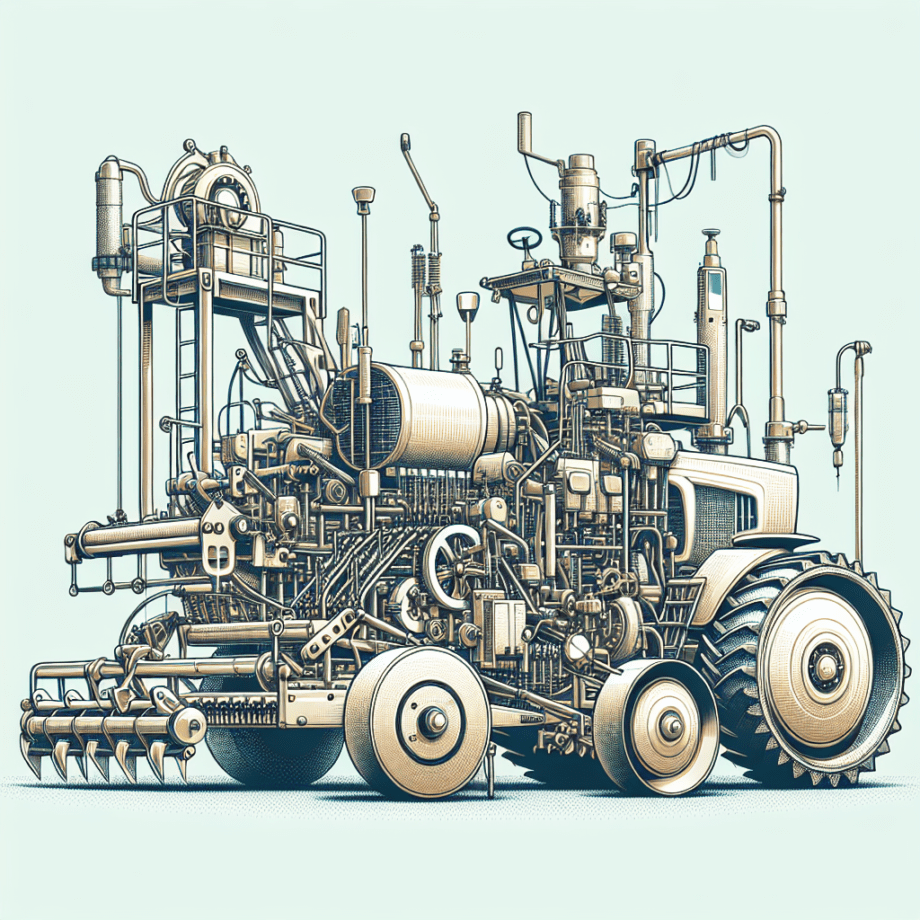Small-scale farmers play a crucial role in the agricultural sector, providing fresh produce and contributing to local economies. To maximize productivity and efficiency, it is essential for these farmers to invest in the right farm machinery. This article explores the essential farm machinery that can significantly benefit small-scale farmers, enhancing their operations and ensuring sustainable farming practices.
Tractors: The Backbone of Small-Scale Farming
Tractors are often considered the backbone of any farming operation, and this holds true for small-scale farmers as well. These versatile machines can perform a wide range of tasks, from plowing and tilling to planting and harvesting. For small-scale farmers, compact tractors are particularly beneficial due to their smaller size and lower cost compared to larger models.
Compact Tractors
Compact tractors are designed to be highly maneuverable, making them ideal for small farms with limited space. They are equipped with powerful engines that can handle various attachments, such as plows, harrows, and seeders. This versatility allows farmers to perform multiple tasks with a single machine, reducing the need for additional equipment.
Moreover, compact tractors are fuel-efficient, which is a significant advantage for small-scale farmers looking to minimize operational costs. Their ease of use and maintenance also make them a practical choice for those who may not have extensive experience with heavy machinery.
Attachments and Implements
The true value of a tractor lies in its ability to work with various attachments and implements. For small-scale farmers, some essential attachments include:
- Plows: Used for initial soil preparation, plows break up and turn over the soil, making it ready for planting.
- Harrows: These tools are used to smooth and level the soil after plowing, ensuring a fine seedbed for planting.
- Seeders: Seeders allow for precise planting of seeds, ensuring even distribution and optimal growth conditions.
- Mowers: Mowers are essential for maintaining pastures and cutting hay, which can be used as animal feed.
- Loaders: Front-end loaders can be used for a variety of tasks, such as moving soil, gravel, or other materials around the farm.
By investing in a compact tractor and the appropriate attachments, small-scale farmers can significantly enhance their productivity and efficiency, making their operations more sustainable and profitable.
Harvesting Equipment: Maximizing Yield and Efficiency
Harvesting is a critical phase in the farming process, and having the right equipment can make a significant difference in the quality and quantity of the yield. For small-scale farmers, investing in efficient harvesting equipment is essential to ensure that crops are harvested at the right time and with minimal loss.
Combine Harvesters
Combine harvesters are versatile machines that can perform multiple functions, including reaping, threshing, and winnowing. While large combine harvesters may be impractical for small-scale farms, there are smaller models available that are specifically designed for limited acreage.
These smaller combine harvesters are highly efficient and can handle a variety of crops, such as wheat, barley, and corn. By using a combine harvester, small-scale farmers can significantly reduce the time and labor required for harvesting, allowing them to focus on other important aspects of farm management.
Manual and Semi-Automatic Harvesters
For farmers who may not have the budget for a combine harvester, manual and semi-automatic harvesters are viable alternatives. These tools are designed to be operated by hand or with minimal mechanical assistance, making them more affordable and accessible.
Manual harvesters, such as sickles and scythes, are traditional tools that have been used for centuries. While they require more physical effort, they are effective for small-scale operations and can be used for a variety of crops. Semi-automatic harvesters, on the other hand, offer a middle ground between manual and fully automated equipment. These machines often feature motorized components that assist with the harvesting process, reducing the physical strain on the farmer.
Irrigation Systems: Ensuring Optimal Water Management
Water management is a critical aspect of farming, and efficient irrigation systems are essential for ensuring that crops receive the right amount of water at the right time. For small-scale farmers, investing in an appropriate irrigation system can lead to significant improvements in crop yield and quality.
Drip Irrigation
Drip irrigation is a highly efficient method of watering crops, delivering water directly to the root zone of each plant. This system minimizes water wastage and ensures that plants receive a consistent supply of moisture. Drip irrigation is particularly beneficial for small-scale farmers, as it can be easily customized to suit the specific needs of different crops and soil types.
Additionally, drip irrigation systems can be automated, allowing farmers to schedule watering times and durations. This automation reduces the need for manual labor and ensures that crops are watered consistently, even when the farmer is not present.
Sprinkler Systems
Sprinkler systems are another popular irrigation method, particularly for larger fields and pastures. These systems distribute water evenly over a wide area, simulating natural rainfall. Sprinkler systems can be either stationary or mobile, with mobile systems offering greater flexibility for small-scale farmers.
While sprinkler systems may require a higher initial investment compared to drip irrigation, they are highly effective for certain crops and can cover larger areas more quickly. By choosing the right irrigation system, small-scale farmers can optimize water usage and ensure that their crops receive the necessary hydration for healthy growth.
Conclusion
Investing in the right farm machinery is essential for small-scale farmers looking to enhance their productivity and sustainability. Compact tractors, harvesting equipment, and efficient irrigation systems are just a few examples of the tools that can make a significant difference in farm operations. By carefully selecting and maintaining the appropriate machinery, small-scale farmers can improve their yields, reduce labor costs, and contribute to a more sustainable agricultural sector.
